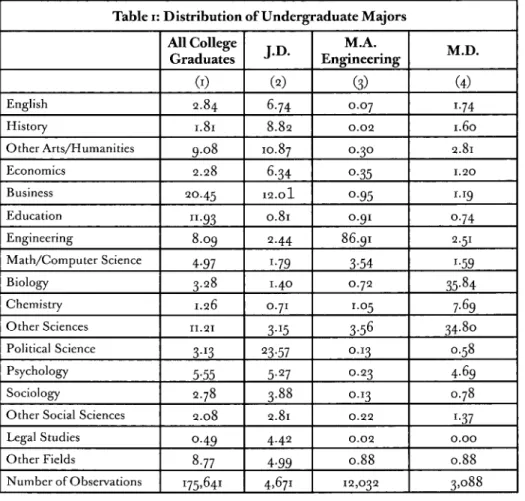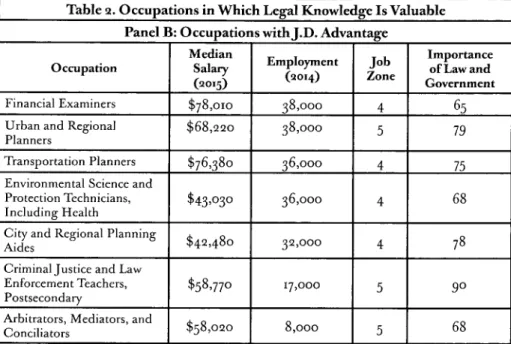Using detailed educational data from the National Survey of College Graduates (NSCG), I show that the lack of field-specific training provided by undergraduate majors hinders learning about the likely fit of potential students with the law school curriculum and the legal profession. See Stanford Law's Larry Kramer on the Law School Revolution, BIG THINK, http://bigthink.com/. And, as I show using data from the NSCG, law school graduates come from a wide range of undergraduate majors.
Students therefore have little opportunity as undergraduates to assess their fit with the law school curriculum.

Such programs that provide training that will allow for similarly attractive professional careers include master of public policy (M.P.P.), master of public administration (M.P.A.), and master of business administration (M.B.A.). A number of law schools also offer master's degree programs in law for non-law scholars.59 The ABA does not formally approve or accredit any degree program through an ABA-approved law school other than the J.D. From this list of 175 schools, only programs not specifically designed for foreign lawyers (LL.M., M.C.L., M.C.J.), not doctoral level (J.S.D., S.J.D.), and not certificate programs were examined.
The programs for non-lawyers are typically focused on specific areas such as tax law (Georgetown, New York University), 65 preparation for the patent bar exam66 (Case Western Reserve, Colorado, Minnesota), 67 business-centered legal training for STEM professionals (Northwestern) ) ,68 or as a supplement to doctoral studies or for those with doctoral training (Yale, Stanford, Cornell, Chicago).69. Taxation- Masters in Law (for Non-Lawyer 7ax Professionals), GEORGETOWN LAW (2o16), http://www.law.georgetown.edu/academics/academic-programs/graduate-programs/. 2oi6), http://www.law.nyu.edu/msltax [https://perma.cc/SC4D-RLY8] ("While the MSL will not prepare or qualify students for the practice of law or to sit for any state bar, CPA exam, or other professional licensing exam, it does provide experienced tax professionals an opportunity to study tax law as it is taught here at NYU Law."). PATENTS AND TRADEMARK OFFICE, GENERAL REQUIREMENTS BULLETIN FOR ADMISSION TO THE EXAMINATION FOR REGISTRATION TO PRACTICE PATENT CASES BEFORE THE UNITED STATES PATENT AND TRADEMARK OFFICE 4 (2o5), http://www.uspto.gov/sites/default.
Masters-in-Patent-Practice [https://perma.cc/4H3R-GWYW] (describes a thirty-credit master's program with an emphasis in patent law for students with undergraduate degrees in engineering or computer science, physics, or biological science); M.S.PL. 2016), https://www.law.umn.edu/academics/degree-programs/mspl-program [https://perma.cc/X6KN-2YCC] (describing a one-year professional degree program that combines lectures in patent law and "project-based learning on business strategies and extensive practical hands-on training"); MSL Degree Program, U. Master of Laws, Nw. 2o16), http://www.law.northwestern.edu/academics/degree-programs/msl/ [https://perma.cc/YH9 F-V9RJ] (describes a one-year program covering legal topics in three major areas : "intellectual property and patent design; business law and entrepreneurship; and regulatory analysis and strategy"). The Yale program is designed for doctoral candidates, doctoral students, or working journalists and, unlike most law master's programs, students of the M.S.L.
Advantages of the Proposed Master of Legal Principles Degree
It is likely that people with lower incomes or less family education would refrain from attending law school due to the high costs and lack of a safety net if they did not complete their studies. The combination of uncertainty about suitability for the legal profession and the certainty of high debt (or at least high opportunity costs for those with substantial scholarships) associated with three years of law school makes law school a riskier proposition for students from less privileged backgrounds . 74. A LAW PROFESSOR'S INSIDE GUIDE TO MAXIMIZING OPPORTUNITIES AND MINIMIZING RISK, advising students to "avoid the sunk cost fallacy and be prepared to leave law school behind.");
TAMANAHA, supra note 13, at 159 ("Any student who begins law school by landing a corporate law job will, by the end of the first year, if possible. My proposed master's degree option would allow law schools to admit potentially more risky students without fear of violating ABA accreditation standards for paralegals, since those students who found their fit for the legal profession to be weak would leave law school with a master's degree, not an aJ.D., and would not be counted as a J.D. Although master's degree option may be accompanied by increased attrition after the iL year, meeting admission targets may be achieved in the same way as admission targets are met under the current system, where there is attrition as students leave law school entirely or switch between law schools, by accepting transfer students (as the is currently done), or by increasing the size of their entering iL class in anticipation of a combination of transfers and those leaving their iL year with a master's degree.8'.
The University of Arizona School of Law began accepting applicants based on the GRE or LSAT in 2016, and Harvard Law School announced a pilot program in fall 2017 to accept GRE-only applicants. to all GREG 7est 7akers after the study reveals the 7est's validity, the U. Risk-averse prospective students will find that the expected payoff from the GRE is higher than that from the LSAT, limiting the diversity of potential law school applicants.
Nonlawyer Occupations in Which Legal Knowledge Is Valuable
To identify those occupations in which legal knowledge is important, consideration of occupations is limited to those occupations that rank at least 6o out of ioo in importance of knowledge in "law and government." rated. These are the occupations with Job Zone ratings of 4 or 5.90 Job Zone 4 states that most occupations "require a four-year bachelor's degree, but some do not." and the education description for Job Zone 5 states that most occupations require graduate school and that some "may require a master's degree, and some require a Ph.D., M.D., or J.D. law degree)". The O*NETJob Zone ranking system categorizes occupations according to the amount of preparation required to do the job, ranging from Job Zone i (occupations that require little or no preparation) to Job Zone 5 (occupations that require extensive preparation).
After the restriction to occupations rated 6o or higher in the sense of knowledge in law and government and with vocational preparation in job zone 4 or 5, sixty-four individual occupations remained. These twenty-six occupations are listed in Table 2, along with median wage, 204 employment, job zone (either 4 or 5, given the restriction to occupations typically requiring a bachelor's degree or higher), and rating of importance of knowledge of law and government (from 6o to ioo, given the restriction to professions with scores of at least 6o). The remaining 29 occupations are listed in Appendix I and are included to indicate the range of occupations in which knowledge of law and government is generally valuable for job performance.
The occupational area and importance ratings reported in Table 2 are based only on those occupations that met the inclusion criteria. Both of these occupations are classified as Job Zone 4, meaning that most jobs in these occupations would not require education beyond a bachelor's degree and therefore would not require a J.D. job. Advantage, but as shown in Table 2, the average salary of compliance officers97 of $65,640 is well below the average salary of lawyers, and it is also in Job Zone 4, showing aJ.D.

Limited Legal Licensing
The ABA's report on the future of legal services in the United States describes "[a] growing number of U.S. The rationale for limited licensing and provision of legal services by nonlawyers is explicitly stated as a means of expanding access to justice.09' The Washington licensing agreement is instructive, as it is currently the only state that licenses non-lawyers to provide limited legal services.
A non-lawyer in Washington who meets the requirements and passes the legal technician exam can provide legal services as a limited license legal technician (LLLT). Those who have completed an iL year are likely to meet most of the educational requirements for a limited legal license in Washington. Thus, state that license non-lawyers for the provision of some legal services may be willing to use the M.L.P.
While state task forces take a narrow view of the areas of practice covered or proposed for limited licensure, concerns about access to justice and lack of representation in underserved communities (such as rural areas) may lead states to increase the scope of legal services that can be provided of. See also LEGAL TECHNICIANS TASK FORCE, supra note 105, at 3 (stating that "the task force's primary concern was the issue of access to the courts"). This parallels the expansion of health services provided by nurses and physician assistants3 Even if the scope of legal services is not greater for those with M.L.P., as with other professional services, potential clients may be willing to pay higher fees to a general practitioner. with a master's degree than to someone who does not have a master's degree.
Conclusion
For example, paid tax return preparers have a wide range of academic preparation14 and the price of tax preparation varies accordingly by type of practitioner. Those highly ranked law schools that currently have very low attrition are likely to continue to have low attrition as the expected benefits of completing the J.D. Attrition at some law schools may increase, but unlike the current situation where those law school leavers leave without an additional credential of any kind, students will instead earn a master's degree that confers a credential of legal knowledge.
Individuals with a master's degree in legal principles would benefit from putting their legal education to productive use in the workforce. Because such knowledge is very valuable in the regulatory and legal environment, it will in turn increase productivity. Access to the courts and the effectiveness of the legal system would also benefit from a broader legal education.
Limited licensing is one option and legal representation could be provided at lower cost by those with M.L.P. But even without specifically providing legal services, legal education is valuable to individuals as they and their families and friends navigate such routine issues in their daily lives as home purchases, divorces, and employment contracts. My proposed master's degree in legal principles would provide a mechanism for law schools to expand the societal role of legal education.